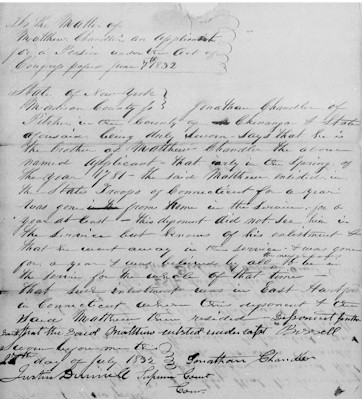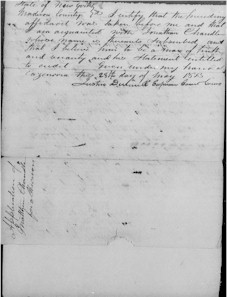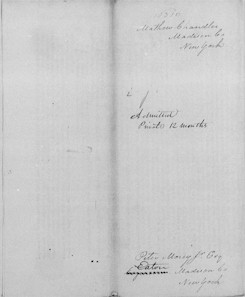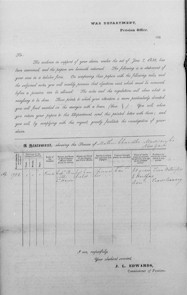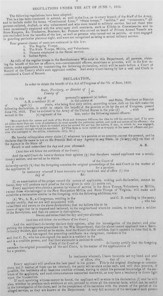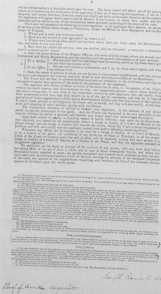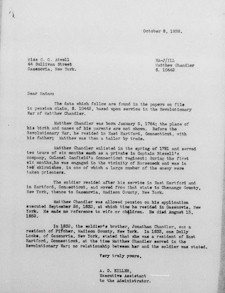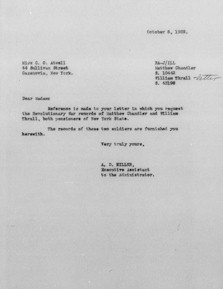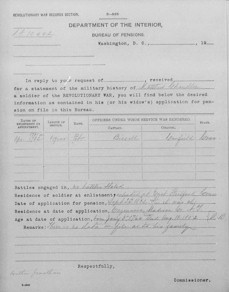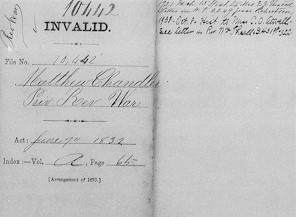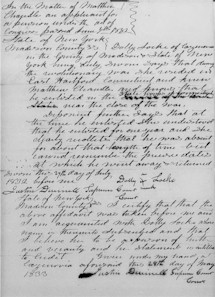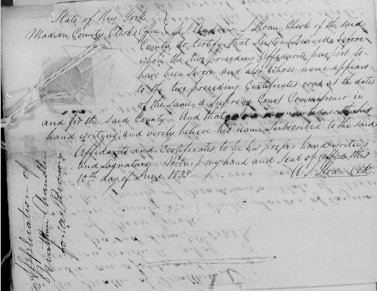|
|
War Department - Pension Office
May 9th 1863
Sir:
The evidence is support of you claim under the act of June 7, 1832 has been examined, and the papers are herewith returned. The following is a statement of your case in a tabular form. On comparing these papers with the following rules, and the subjoined notes you will readily perceive that objections exist, which must be removed, before a pension can be allowed. The notes and the regulations will show what is necessary to be done. Those points to which your attention is more particularly directed, you will find marked in the margins with a brace ( thus:} ) You will, when you return your paper to this Department, send this printed letter with them; and you will, by complying with this request greatly facilitate the investigation of your claim.
STATEMENT, showing the Service of Mathew Chandler Madison Co. New York
| Period when the service rendered
|
Duration of the claiments service
|
Rank of the Claiment
|
Name and Rank of the Company officers under whom he served
|
Name and Rank of the General and Field Officers
|
Battles in which the applicant was engaged
|
Country through which he marched.
|
Place of abode when he entered the service and age at the present period
|
Evidence by whih the declaration is supposed
|
| Ap 1782
|
1 yr " Months " Days
|
Private
|
Capt Birsell Lt. Howe
|
Col. Canfield
|
Skirmed ___
|
Conn
|
68 years
E. Hartford
Conn.
|
Two witnesses
Traditionary
|
|
I am respectfully,
Your Obedient servant,
J. L. EDWARD
Commissioner of Pensions
|
|
REGULATIONS UNDER THE ACT OF JUNE 7, 1832
The following regulations have been adopted:
This law has been construed to extend, as well to the line, as to every branch of the Staff of the Army, and
to include under the terms "Continental Line," "State troops," "militia," and "volunteers," all persona enlisted,
drafted, or who volunteered and who were bound to military service, but not those who were occasionally employed
with, the army upon civil contract, such as Clerks to Commissaries and to Store Keepers, &c. Teamsters. Boatmen,
&c. Persons who served on board of Private Armed Vessels are also excluded from the benefits of the law, as well
as persons who turned out as patrols, or were engaged in guarding particular places at night, and were not
recognized as being in actual military service.
Four general classes of cages are embraced in this law:
1. The Regular Troops
2. The State Troops, Militia and Volunteers.
3. Persons employed in the Naval service.
4. Indian Spies.
As rolls of the regular troops in the Revolutionary War exist in this Department, all persons, claiming the
benefit of this law as officers, non-commissioned officers, musicians or privates, will in the first instance,
make application by transmitting the following declaration, which will be made before a Court of Record of the
County where such applicant resides. And every Court having by law a seal and Clerk is considered a Court of Record.
DECLARATION
In order to obtain the benefit of THE Act of Congress of the 7th of Jane, 1832.
State, Territory, or District of )
County of
On this day of personally appeared (a) before
A. B. a resilient (b) of in the county of and State, Territory or District
of aged (c) years, who being first duly sworn, according to law. doth on his oath make the
following declaration, in order to obtain the benefit of the provion made by the act of Congress, passed
June 7, 1832. That he enlisted in the Army of the United .States in the year (d) , with
served in the (e) regiment of the line, under the following named officers:
[Here set forth th names and rank of the Field and Company Officers, the time he left the service (and if
he served under more than one term of enlistment, he mus speify the particular period, and rank and names
of his officers;) the town or county and State in which he resided when he enterd the service; the battles,
if any in which he was engaged, and the country through which he marched. This form is to be varied so
as to apply to the cases of officerts and persons who belonged to the militia, lvolunteers, name&c.]
He hereby relinquishes every claim (f) whatever to a pension or an annuity,, except the present, and he
declares 'that his name is not on the Pension Roll of any Agency in any State, or (if any) only on that
of the Agency in the State of
Sworn to and subscribed the day and year aforesaid A. B.
[And then will follow the certificate of the Court.)
And the said Court do hereby declare their opinion (g) that the above named applicant was a revolu¬tionary
soldier, and served as he stated.
I of the Court of
Do hereby certify (h) that the foregoing contains the original proceedings of the said Court in the, matter of
the application of for a pension
In testimony whereof I have hereunto set my hand and seal of office (i) this
day of &c.
If, on examination of the proper record the names of applicants, making such declaration, cannot be found,
they will produce such proof as the rule given in note (j) points out
Every applicant who claims a pension by virtue of service in the Stale Troops, Volunteers or Militia, except
those who belonged to the New Hampshire Militia and State Troops of Virginia, will make and subscribe a
declaration similar to the foregoing, with, the following additions, viz:
k) We, A. B., a Clergyman, residing in the and C. D. residing in (the sameP
hereby certify, that we are well acquainted with , who has
subscribed and sworn to the above declaration; that we believe him to be
years of age; that he is reputed and believed, in the neighborhood where he resides, to have been a soldier
in the Revolution, and that we concur in that opinion.
Sworn and subscribed the day and year aforesaid.
[And then will follow the certificate of the Court.]
And the said Court do hereby declare their opinion, after the investigation of the matter, and after putting
the interrogatories prescribed by the War Department, that the above named applicant waa a Revolutionary Soldier,
and served as he states. And the Court further certifies, that it appears to them that A. B.
who has signed the preceding certificate is a clergyman, resident in the and that C. D., who has also
signed the same is a resident in the and is a credible person, and that their statement
is entitled to credit.
I, Clerk of the Court of do hereby certify that the foregoing
contains the original proceedings of the said Court, in the matter of the application of for a pension.
In testimony whereof, i have hereunto set my hand and seal
of office, this day of &c.
Every applicant will produce the best proof in his power. This is the original discharge or commission; but it
neither of these can be obtained, the party will to state under oath, and will then procure, if possible, the
testimony of at least one credible witness, stating in detail his personal knowledge of the services of the
applicant, and such circumstances connected therewith, as may have a tendency to throw light upon the transaction.
If such surviving witness cannot be found, the applicant will state in his declaration (l) and he will also,
whether he produce such evidence or not, proceed to relate all the material facts, which can be useful in the
investigation of his claim, and is the comparison of his narrative with the events of the period of his alleged
service, as they are known at the Department. A very full account of the services of each person will be indispensable
to a favorable action upon his case. The facts state, I will afford one of the principal means of corroborating the
declaration of the applicant, if true, or of detecting the imposition if one be attempted and unless, therefore,
these are amply and clearly set forth, no favorable decision can be expected. All applicants will appear before
some Court of Record in the County, in which they reside, and there subscribe and be sworn to, one of the declarations
above provided, according to the nature of his case.
The Court will propound the following (m) interrogatories to all applicants for a pension, on account of
service in the Militia, State troops, or Volunteers, except the Militia of New Hampshire and the State
troops of Virginia.
1. Where and in what year were you born?
2. Have you any record of your age, and if to, where is it?
3. Where were you living when called into service; where have you lived since the Revolutionary
war, and where do you now live?
4. How were you called into service; were you drafted, did you volunteer, or were you a substitute?
And if a substitute, for whom?
5. State the names of some of the Regular Officers, who were with tbe troops, where you served; such
Continental and Militia Regiments as you can recollect, and the general circumstances of your services.
6. To a Soldier, Did you ever receive a discharge from the service, and if so, by whom was it given and
and what has become of it?
To an Officer Did you ever receive a commission, and if so, by whom was it signed, and what
has become of it?
7. State the names of persons to whom you are known in your present neighborhood, and who can testify
as to your character for veracity, and their belief of your service as a soldier of the Revolution.
The Court will see that the answers to these questions are embodied in the declaration, and they are
requested to annex their opinions of the truth of the statement of the applicant.
The applicant will further produce in Court, if the same can be done, in the opinion of the Court,
without too much expense and inconvenience to him, two respectable persons - one of whom should be
the nearest clergyman, if one lives in the immediate vicinity of such applicant, who can testify,
from their acquaintance with him, that they believe he is of the age he represents, and that he is
reputed and believed in the neighborhood to have been a Revolutionary soldier, and that they concur
in that opinion. If one of these persons is a Clergyman, the Court will so certify, and they will
also certify, to the character and standing of other persons, giving such certificates.
The traditionary evidence of service is deemed very important, and in the absence of any direct proof,
except the declaration of the party. And the Courts are requested to be very particular in the enquiry
whether the belief is general, and whether any doubts have ever exhibited upon the subject.
Applicants unable to appear in Court by reason of bodily infirmity, may make the declaration before
required, and submit to the examination, before a Judge or Justice of a Court of Record of the proper
county, and the Judge or Justice will execute the duties, which the Court is herein requested to perform,
and will also certify that the applicant cannot, from bodily infirmity, attend the Court.
Whenever any official act is required to be done by a Judge or Justice of a Court of Record, or by a
Justice of the Peace, the certificate of the Secretary of State or Territory or of the proper Clerk
of the Court or County, under his seal of office, will be annexed, stating that such person is a Judge
or Justice of a Court of Record, or a justice of the Peace, and that the signature annexed is his
genuine signature.
No payments can be made on account of the services of any person, who may have died before the taking
effect of the act of June 7, 1832; and in case of death subsequent thereto, and before the declaration
herein required is made, the parties interested will transmit such evidence as they can procure, taken
and authenticated before, a Court of Record, showing the services of the deceased, the period of his death,
the opinion of the neighborhood respecting such services, the title of the claimant, and the opinion of the
Court upon the whole matter.
[a] The declarant moil appear in open Court unless prevented from doing so by reason of bodily
infirmity; in which case the declarant will follow the rule laid down for his guidance.
(b) The declarant must make his declaration in the county where he resides. If he should fail to do so,
he must assign a sufficient reason for not conforming to the rule.
(c) The age of the claimant must invariably be mentioned.
(d) The declarant must mention the period or periods of the war when he served.
(e) Every continental officer or soldier must give the name of the Colonel under whom he served;
otherwise a satisfactory examination of the claim cannot be had. Every claimant must state, with precision,
the length of his service, and the different grades in which he served, in language so definite as to enable
the Department to determine to what amount of petition he is entitled. In a case where the applicant cannot,
by reason of the loss of memory, state precisely how long he served, he should amend his declaration by making
an affidavit in the following words:
" Personally appeared before me, the undersigned, a Justice of the Peace, &c. A- B. who, being duly sworn,
deposeth, and saith, that, by reason of old age, and the consequent loss of memory, he cannot swear positively
as to the precise length of his service; but, according to the best of his
recollection, he served not less than the period mentioned below, and in the following grades:-— For - year — — —
months, and — — — days, I served as a ---- For -- months and --- days, I served as ---; and for such service
I claim a pension."
It is important, in all cases, to determine with precision the period for which each applicant served, and the
particular rank he held, s the law directs the pension to be paid according to the grade of the pensioner and
the length of his service. The use of the phrase about three or four months, is too indefinite, and all such
qualifying expressions are objectionable. Some persons who apply for pensions merely state that they served two
years in the militia, &c without specifying the tours, the names of the officers , and other particulars respecting
their service. This form of a declaration is highly objectionable. It must, in every case, be clearly shown under
what officers the applicant served; the duration of each term of engagement; the particular place or places where
the service was performed; that the applicant served with an embodied corps called into service by competent
authority; that he was either in the field or in garrison; and for the time during which the service was performed,
he was not employed in any civil pursuit.
(f) The law makes the relinquishment indispensable.
(g) The opinion of the Court is required.
(h) The Clerk must give his certificate in every case.
(i) The Clerk must affix his seal, and if it has no device or inscription by which it can be distinguished from
any other seal, or if he has no public seal of office, the certificate of a Member of Congress, proving the official
character and signature of the certifying officer, should accompany the papers.
Mode of authenticating papers.
In every instance where the certificate of the certifying officer who authenticated the papers is not written on the
same sheet of paper which contains the affidavit, or other papers authenticated, the certificate must be attached
thereto by a piece of tape or narrow ribbon, the ends of which must pass under the seal of office of the certifying
officer, so as to prevent any paper from being improperly attached to the certificate.
Proof of Service
(j) In a case where the name of the applicant is ant found on the records of the Department, he must prove his
service by two credible witnesses, who are required to set forth in their affidavits the time of the claimant's
entering the service, and the time and manner of his leaving the same, as well as the regiment, company, and line
to which he belonged. The magistrate who may administer the oaths much certify to the credibility of the witnesses,
and the official character and signature of the magistrate must be certified by the proper officer, under his
seal of office.
The notes from (a) to (i) are all equally applicable to the cases of Militia man, Volunteers and State Troops.
The proof required by rule in not (j) applies to continental troops only.
(k) This traditionary evidence is indispensable in militia cases.
(l) If a witness cannot be found, the declarant must state that fact.
(m) The answers to the interrogatories must all be written, and sent to the War Department with the declaration.
Joseph Rowen E ck
The traditionary evidence of service is deemed very important, and in the absence of any direct proof,
except the declaration of the party. And the Courts are requested to be very particular in the enquiry
whether the belief is general, and whether any doubts have ever exhibited upon the subject.
Applicants unable to appear in Court by reason of bodily infirmity, may make the declaration before
required, and submit to the examination, before a Judge or Justice of a Court of Record of the proper
county, and the Judge or Justice will execute the duties, which the Court is herein requested to perform,
and will also certify that the applicant cannot, from bodily infirmity, attend the Court.
Whenever any official act is required to be done by a Judge or Justice of a Court of Record, or by a
Justice of the Peace, the certificate of the Secretary of State or Territory or of the proper Clerk
of the Court or County, under his seal of office, will be annexed, stating that such person is a Judge
or Justice of a Court of Record, or a justice of the Peace, and that the signature annexed is his
genuine signature.
No payments can be made on account of the services of any person, who may have died before the taking
effect of the act of June 7, 1832; and in case of death subsequent thereto, and before the declaration
herein required is made, the parties interested will transmit such evidence as they can procure, taken
and authenticated before, a Court of Record, showing the services of the deceased, the period of his death,
the opinion of the neighborhood respecting such services, the title of the claimant, and the opinion of the
Court upon the whole matter.
[a] The declarant moil appear in open Court unless prevented from doing so by reason of bodily
infirmity; in which case the declarant will follow the rule laid down for his guidance.
(b) The declarant must make his declaration in the county where he resides. If he should fail to do so,
he must assign a sufficient reason for not conforming to the rule.
(c) The age of the claimant must invariably be mentioned.
(d) The declarant must mention the period or periods of the war when he served.
(e) Every continental officer or soldier must give the name of the Colonel under whom he served;
otherwise a satisfactory examination of the claim cannot be had. Every claimant must state, with precision,
the length of his service, and the different grades in which he served, in language so definite as to enable
the Department to determine to what amount of petition he is entitled. In a case where the applicant cannot,
by reason of the loss of memory, state precisely how long he served, he should amend his declaration by making
an affidavit in the following words:
" Personally appeared before me, the undersigned, a Justice of the Peace, &c. A- B. who, being duly sworn,
deposeth, and saith, that, by reason of old age, and the consequent loss of memory, he cannot swear positively
as to the precise length of his service; but, according to the best of his
recollection, he served not less than the period mentioned below, and in the following grades:-— For - year — — —
months, and — — — days, I served as a ---- For -- months and --- days, I served as ---; and for such service
I claim a pension."
It is important, in all cases, to determine with precision the period for which each applicant served, and the
particular rank he held, s the law directs the pension to be paid according to the grade of the pensioner and
the length of his service. The use of the phrase about three or four months, is too indefinite, and all such
qualifying expressions are objectionable. Some persons who apply for pensions merely state that they served two
years in the militia, &c without specifying the tours, the names of the officers , and other particulars respecting
their service. This form of a declaration is highly objectionable. It must, in every case, be clearly shown under
what officers the applicant served; the duration of each term of engagement; the particular place or places where
the service was performed; that the applicant served with an embodied corps called into service by competent
authority; that he was either in the field or in garrison; and for the time during which the service was performed,
he was not employed in any civil pursuit.
(f) The law makes the relinquishment indispensable.
(g) The opinion of the Court is required.
(h) The Clerk must give his certificate in every case.
(i) The Clerk must affix his seal, and if it has no device or inscription by which it can be distinguished from
any other seal, or if he has no public seal of office, the certificate of a Member of Congress, proving the official
character and signature of the certifying officer, should accompany the papers.
Mode of authenticating papers.
In every instance where the certificate of the certifying officer who authenticated the papers is not written on the
same sheet of paper which contains the affidavit, or other papers authenticated, the certificate must be attached
thereto by a piece of tape or narrow ribbon, the ends of which must pass under the seal of office of the certifying
officer, so as to prevent any paper from being improperly attached to the certificate.
Proof of Service
(j) In a case where the name of the applicant is ant found on the records of the Department, he must prove his
service by two credible witnesses, who are required to set forth in their affidavits the time of the claimant's
entering the service, and the time and manner of his leaving the same, as well as the regiment, company, and line
to which he belonged. The magistrate who may administer the oaths much certify to the credibility of the witnesses,
and the official character and signature of the magistrate must be certified by the proper officer, under his
seal of office.
The notes from (a) to (i) are all equally applicable to the cases of Militia man, Volunteers and State Troops.
The proof required by rule in not (j) applies to continental troops only.
(k) This traditionary evidence is indispensable in militia cases.
(l) If a witness cannot be found, the declarant must state that fact.
(m) The answers to the interrogatories must all be written, and sent to the War Department with the declaration.
Proof of service required.
|









